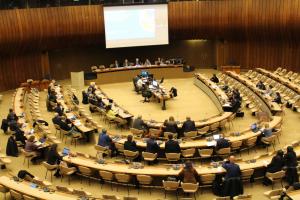
Countries are increasingly facing multiple interlinked environmental, social, economic and health challenges – climate change, pollution from chemicals and wastes, biodiversity loss and species extinction, deforestation, land degradation, emerging zoonotic diseases, and the impact of armed conflicts on the lives and well-being of people and on the environment. The complexity of addressing these challenges is compounded by the urgent need for regulatory measures, legislative changes and good environmental governance at all levels.
Access to justice is an essential element of safeguarding the rule of law protecting the environment, sustainable development and human health and well-being. Members of the public are increasingly seeking access to justice to reduce exposure to pollution, ensure climate action, or minimize environmental impacts of unsustainable energy-related decision-making.
The Convention on Access to Information, Public Participation in Decision-making and Access to Justice in Environmental Matters (Aarhus Convention) continues to play a crucial role in ensuring effective access to justice in such cases. At its fifteenth meeting (Geneva, 4–5 April 2023), the Task Force on Access to Justice under the Aarhus Convention gathered approximately 120 delegates representing Governments, supreme, administrative and constitutional courts, chief prosecutors’ offices, international organizations, international financial institutions, non-governmental organizations (NGOs), academia and other stakeholders. The discussions focused on access to justice in cases related to climate change and biodiversity protection. Delegates also shared experiences in access to justice in energy-related cases, and took stock of measures removing barriers related to costs, access to assistance mechanisms and timeliness of review procedures. Furthermore, the Task Force took into account the devastating impact of the war in Ukraine on the implementation of the access to justice obligations under the Convention. Various tools to promote effective access to justice were also considered, including: access to independent environmental expertise; dissemination of information on access to review procedures, collection of relevant data and statistics and access to relevant case law using e-justice initiatives and modern digital technologies; and multi-stakeholder dialogues to remove existing barriers.
The meeting was preceded by the 2023 Judicial Colloquium (Geneva, 3–4 April 2023), which brought together representatives of the judiciary, judicial training institutions and other independent review bodies from 26 countries. The event focused on the adjudication of cases related to environmental pollution from chemicals and wastes. Participants discussed the role of the Aarhus Convention and its linkages with the Basel Convention on the Control of Transboundary Movements of Hazardous Wastes and Their Disposal, the Rotterdam Convention on the Prior Informed Consent Procedure for Certain Hazardous Chemicals and Pesticides in International Trade, the Stockholm Convention on Persistent Organic Pollutants, the Minamata Convention on Mercury, the European Convention on Human Rights and other international human rights law in enforcing environmental law. Participants also shared perspectives on future trends in access to justice, in particular regarding effective remedies, and discussed ways to strengthen capacity-building for judiciary and other independent review bodies.
The Judicial Colloquium was convened by UNECE, in cooperation with the United Nations Environment Programme, the United Nations Development Programme, the Organization for Security and Cooperation in Europe, the International Union for Conservation of Nature World Commission on Environmental Law, the Global Judicial Institute on the Environment, the European Union Forum of Judges for the Environment and other partner organizations.
The outcomes of both meetings are expected to strengthen the capacity of governmental officials, members of the judiciary, NGOs and other stakeholders to promote effective access to justice in environmental matters. The meetings were particularly timely in terms of advancing the implementation of the 2030 Agenda for Sustainable Development, supporting the in-depth review of Sustainable Development Goals 1 (no poverty), 2 (zero hunger), 13 (climate action), 16 (peace, justice and strong institutions) and 17 (partnerships for the Goals) next year, and contributing to the implementation of the Kunming-Montreal Global Biodiversity Framework, adopted by the Conference of the Parties to the Convention on Biological Diversity at its 15th meeting (part I, Kunming, China, 11–15 October 2021; part II, Montreal, Canada, 7–19 December 2022).

